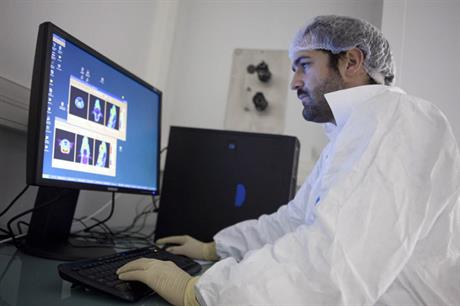The life sciences at the CEA have developed within a strong culture of innovation and technology transfer, in line with the resolutely industrial orientation of the establishment. The Division of Life Sciences (DSV) thus leads an active policy of developing its skills, equipment and results in two segments: energy and health.
Opening its advanced equipment and associated expertise to industry
The DSV places its technological environment and equipment at the service of an assertive innovation policy that is open to industry, offering easy access to its own equipment. It participates in the scientific interest association IBiSA (Infrastructures in Biology, Health and Agriculture). This group supports, finances and evaluates the main national research platforms in biology, giving them visibility and a system of quality management adapted to the requirements of industry. Many of these platforms are implicated in the structuration and funding dispositive of the Investissements d’Avenir Program: National Infrastructures in biology and health. The DSV is directly involved in eight of them (France Génomique, FLI, NeurATRIS, IDMIT, PROFI, FRISBI, MetaboHub, IFB).
Intellectual property
The DSV pays great attention to the protection of its intellectual property and holds a portfolio of 164 active patents that were the subject of 46 license agreements as of the end of 2014.
Collaborative research
The DSV fosters research partnerships with industry. Collaboration through services is possible, but the sharing of expertise in joint research programs is the preferred mode. DSV teams are heavily engaged in research agreements, on either a bilateral basis or as a consortium involving several partners, often in the framework of projects supported by national or European funding.
The partners of the DSV are just as much large industrial groups (AREVA, BioMérieux, EDF, L’Oréal, Pierre Fabre, Sanofi, Servier, Siemens, Total Énergies Nouvelles) as they are small and medium enterprises (Anova Plus, Bertin Pharma, Fermentalg, Guerbet).
Collaboration in the long run can be done in the form of hosting private teams in the CEA premises.
 | In a translational research process (see box), the MIRCen research center (CEA-I2BM/INSERM) uses preclinical models as means for exploration and study that are directly transposable to humans. A positron emission tomography camera (PET scan) adapted to small animals is shown. ©C.Dupont/CEA |
The creation of spin-off companies
The DSV has enabled the creation of approximately twenty startups, primarily in the biomedical field. The technological spin-off is an effective way of maturation and development of patents at the CEA, with licensed companies eligible for efficient technical and commercial accompaniment.
Some companies that have benefited from the spin-off process at the CEA:
The objective of translational research is to promote the coupling between basic, preclinical, clinical and pharmaceutical research. The facilitated interaction between researchers from these different specialties can significantly accelerate the development of therapeutic innovations. The DSV applies this approach in the fields of neuropathology and infectious diseases. Its teams have, for example, contributed to the clinical validation of gene therapy for Parkinson’s disease. In line with the European roadmap EATRIS, the DSV coordinates two national infrastructures for translational research: NeurATRIS (for the neurosciences) and IDMIT (for experimental models and vaccine technologies).
- Theranexus designs and develops, based on strong intellectual property built at the CEA, original combinations of drugs aimed to improve the treatment of psychiatric diseases.
- Cytoo manufactures and markets products used in cell-based assays and the screening of cells for research in life sciences. Based on monitoring of the cellular microenvironment, this technology allows an optimal reduction in cell variability.
- Imstar designs, manufactures and markets innovative systems for the processing and analysis of cellular imaging. These systems are particularly dedicated to the study of pathophysiological processes, the diagnosis of genetic diseases and cancer, and the discovery of new drugs.
- Bertin Pharma (formerly SPI-BIO), a subsidiary of Bertin Technologies, provides service and consulting in analysis, pharmacology and pharmacokinetics. It also designs and sells immunological reagents and assay kits for the pharmaceutical industry and biodefense.